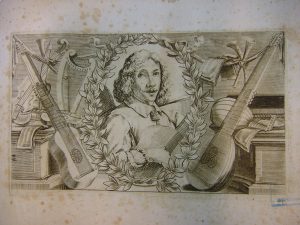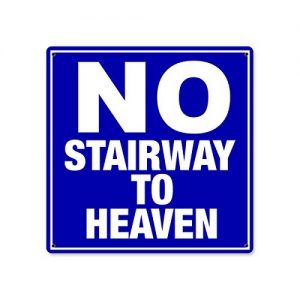Wagon Wheel (1973)
by Jochen Markhorst
The film Wayne’s World is the debut of Mike Myers and at the time of its release, in 1992, a huge commercial success. The reviews are mostly positive and that’s remarkable; much more than a chain of adolescent jokes, clumsy fluttering and bungling (especially from cult favorite Garth, Dana Carvey) and exaggerated parody nonsense, the film doesn’t really offer. Although… the supporting roles of the overacting Rob Lowe and the way he says literally, the classic headbang scene of course, in that little car on “Bohemian Rhapsody” and Garth’s hilarious playback act with “Foxy Lady” are still irresistible a few decades later. And: that one scene in the music store, the eleven seconds in which Myers stuffs his No Stairway joke, has eternal value. Wayne wants to buy a new guitar, starts playing “Stairway To Heaven”, but the seller intervenes after just two notes and silently points out the prohibition sign: NO STAIRWAY TO HEAVEN.
It’s a joke that meets with a lot of recognition and approval, especially among music store staff, and a joke that leads to an unexpected, profitable byproduct: the signs are a sales hit to this day. Most guitar shops have one nowadays, and on Amazon a faithful copy still is a strong seller ($29.99).
Via a detour, the scene will be just as topical again in 2016, by the way. At the time, the joke causes some surprise because the two or three notes Wayne plays don’t resemble Stairway at all. That has a legal background: the lawyer rabble guarding the rights of Led Zeppelin prohibits the use of “Stairway To Heaven” in the movie, so Mike Myers only plays a few rather random notes
 However, in the twenty-first century the heirs of Randy California are trying to prove that Led Zeppelin’s Jimmy Page stole the melody from “Taurus”, a short instrumental piece from 1968 by Randy’s band Spirit. In the course of the court case it is shown that the melody is much and much older; it can already be found in a baroque piece from 1630, “Sonata di Chitarra, e Violino, con il suo Basso Continuo” from the Italian guitarist/composer Giovanni Battista Granata. Thus, in April 2016 the court rules that the melody belongs to the public domain and can therefore not be claimed by anyone.
However, in the twenty-first century the heirs of Randy California are trying to prove that Led Zeppelin’s Jimmy Page stole the melody from “Taurus”, a short instrumental piece from 1968 by Randy’s band Spirit. In the course of the court case it is shown that the melody is much and much older; it can already be found in a baroque piece from 1630, “Sonata di Chitarra, e Violino, con il suo Basso Continuo” from the Italian guitarist/composer Giovanni Battista Granata. Thus, in April 2016 the court rules that the melody belongs to the public domain and can therefore not be claimed by anyone.
It would mean, alert journalists report, that the famous intro may be played with impunity in the event of a possible re-release of Wayne’s World – at least, until the music shop assistant intervenes, of course.
The plagued store staffs have more candidates for such an official ban. “Smoke On The Water”, for example, and “Sweet Home Alabama”, or “Sunshine Of Your Love”… in every guitar shop in the world those intros, in more and less gruesomely mutilated versions, are played a dozen times a day. Still, the next prohibitory sign that is eagerly in demand is not one of the usual suspects.
That would be a ban on playing a Dylan song. And not on one of the obvious everyman’s friends like “Knockin’ On Heaven’s Door” or “All Along The Watchtower”, but on the unlikely, by Dylan himself long rejected ditty, “Wagon Wheel”.
“Wagon Wheel”, or “Rock Me Mama (Like A Wagon Wheel)”, as the song is actually called, is again one of those songs with a history that would be unique to any other artist, but is not exceptional in Dylan’s catalogue at all. Songs like “Love Is Just A Four-Letter Word”, “Quinn The Eskimo”, “Farewell, Angelina” or “Stepchild”; (sketches of) songs that were rejected by the master and later picked up and perfected by others could fill a very nice double-cd.
“Rock Me Mama” may be the most unfinished, sketchy snippet in that collection. It can be found on the bootleg Peco’s Blues, a collection of session recordings from January and February 1973 for the soundtrack of Pat Garrett And Billy The Kid. Charming, messy recordings of a reasonable quality, that are historically especially interesting because of the embryonic versions of “Knockin’ On Heaven’s Door”, but for the fans the studio talk and the other takes are fun too. And the two versions of “Rock Me Mama”.
On this bootleg the song is attributed to the legend Arthur Crudup, the man to whom we owe Elvis Presley. That’s remarkable. Normally Dylan is not too lenient with granting copyrights to a rightholder, not even if he copies entire text parts, melody lines or complete choruses. On top of that, this song has nothing in common with Crudup’s “Rock Me Mama” from 1944; only the title is the same. And Crudup himself has borrowed it from Big Bill Broonzy’s “Rockin’ Chair Blues” (1940). The wagon wheel metaphor comes from other, even older blues songs. Curtis Jones sings as early as 1939 roll me mama, just like I’m a wagon wheel (“Roll Me Mama”) and Dylan undoubtedly knows B.B. King’s hit “Rock me” from 1964, with the lines roll me baby like you roll a wagon wheel.
Dylan uses about those words for his refrain, he sings it on a very accessible, simple melody, over an equally simple and pleasant chord progression, around it he mumbles some unintelligible sounds and that’s it.
 The song has since long been forgotten and covered in dust, when the teenager Ketch Secor, sometime in the 90s, first hears the half-mumbled, unfinished patch of a non-existent song on that bootleg collection.
The song has since long been forgotten and covered in dust, when the teenager Ketch Secor, sometime in the 90s, first hears the half-mumbled, unfinished patch of a non-existent song on that bootleg collection.
Teenagers, especially the male ones, are known to have a rather flexible prefrontal cortex, therefore they dare to ride down the hill in shopping carts, jump three floors down from the balcony into the hotel swimming pool and they do not mind messing around with a Dylan song. Ketch adds two great verses to the sketch, and merrily and often plays the song. And still does after he founded a band, the now world-famous Old Crow Medicine Show.
A first time the boys record the song for a self-released EP (Troubles Up And Down The Road, 2001). In 2003 the band scores a record deal and, after copyright has been arranged with Dylan (it shall be fifty-fifty), the song is recorded again, this time as the closing number for the acclaimed, untitled debut album from 2004. It is not a hit, it is not even released on single, but it is picked up. Initially by amateurs, on talent shows, by school bands, in karaoke bars and truck stops – the song is easy to play and has a high sing-along quality – and slowly and surely it seeps through to the higher echelons.
Old Crow Medicine Show – Wagon Wheel:
In 2012 the Irishman Nathan Carter reaches the top of the charts with the single “Wagon Wheel” and the album of the same name. A year later, when Darius Rucker scores a number one hit with it, the song definitively reaches the Great American Songbook. It earns Rucker a Grammy Award (Best Country Solo Performance, 2013) and membership in the Grand Ole Opry.
It does have a small spicy edge, Rucker’s success. Before his solo career, Darius Carlos Rucker has been the face of Hootie & The Blowfish, the band with which he records five albums and sixteen hit singles, tours around the world and sells tens of millions of records (the debut album from 1994, Cracked Rear Window, achieves sixteen times platinum and is the 14th best-selling album of all time). One of the biggest successes is the world hit “Only Wanna Be With You” (1995) and that song leads to a conflict with Dylan. Rucker has plundered Blood On The Tracks a little too enthusiastically. Starting with a chip from “You’re A Big Girl Now”:
Put on a little Dylan Sitting on a fence
Followed by a big bite from “Idiot Wind”:
Said I shot a man named Gray Took his wife to Italy She inherited a million bucks And when she died it came to me I can't help it if I'm lucky
And in case we still don’t get it, the last verse opens with:
Yeah I'm tangled up in blue
Dylan’s management of Dylan, the thief of thoughts who has a rather double-minded attitude with regard to citing someone else’s work without acknowledging the source, mobilises lawyers, threatens with a copyright infringement indictment and eventually Hootie & The Blowfish settles the case, for an unknown, but undoubtedly substantial amount.
Nevertheless, no hard feelings with Rucker, apparently. With “Wagon Wheel” he lines Dylan’s pockets once again. But it also has an unexpected, negative effect: Rucker’s hit version gives the song a second, huge boost. So much so, in fact, that it becomes after Stairway the second song for which prohibition signs are manufactured, sold and hung by the thousands. This time not in music shops, but in concert halls, pubs and festivals. At Americana festivals, like in New England, No Wagon Wheel zones are set up, T-shirts with the logo fly sell like hot cakes, and students risk guitar shattering when they play it on campus.
Nevertheless, Ketch Secor still likes to play it, with his Old Crow Medicine Show. He is particularly struck by Dylan’s approval and the old master’s next step: in 2014 Dylan gives him another scrap of that 1973 bootleg, “Sweet Amarillo”, and encourages the band to complete that song as well. It gives them their next hit.
On a country channel, CMT News, Secor tells the story behind it. First, he receives an e-mail from Dylan’s manager congratulating him on Ruckers no. 1 hit. A few weeks later there is a package in the bus. It contains a demo recording and a note. From Dylan.
“It’s quite amazing to me. Bob very much cleaned out his dresser drawer and found a scrap and said [in a Dylan voice], “Here, try this.” Just to hear that is the stuff that dreams are made of. I couldn’t even write a script. The audience wouldn’t believe it. “Oh, yeah, then Bob Dylan called and said, ‘OK, finish this song now.’”
So I finished the song with Old Crow, and we sent it back to Bob and he said, “Hey, that sounds great, but I think Ketch should play the fiddle, not the harmonica, and I think the chorus needs to come in at the eighth bar, not the 16th.” We did exactly what Bob said, and it’s like the song sprouted wings and flew.”
He’s still glowing – justifiably – with pride, the lucky Wilbury.
Old Crow Medicine Show – Sweet Amarillo
You might also enjoy:
Wagon Wheel: Untold Dylan’s 500th review which contains the original Dylan sketch of the song.
—————-
Jochen is a regular reviewer of Dylan’s work on Untold. His books are available via Amazon both in paperback and on Kindle:
- Blood on the Tracks: Dylan’s Masterpiece in Blue
- Blonde On Blonde: Bob Dylan’s mercurial masterpiece
- Where Are You Tonight? Bob Dylan’s hushed-up classic from 1978
- Desolation Row: Bob Dylan’s poetic letter from 1965
- Basement Tapes: Bob Dylan’s Summer of 1967
Untold Dylan: who we are what we do
Untold Dylan is written by people who want to write for Untold Dylan. It is simply a forum for those interested in the work of the most famous, influential and recognised popular musician and poet of our era, to read about, listen to and express their thoughts on, his lyrics and music.
We welcome articles, contributions and ideas from all our readers. Sadly no one gets paid, but if you are published here, your work will be read by a fairly large number of people across the world, ranging from fans to academics. If you have an idea, or a finished piece send it as a Word file to Tony@schools.co.uk with a note saying that it is for publication on Untold Dylan.
We also have a very lively discussion group “Untold Dylan” on Facebook with around 7000 active members. Just type the phrase “Untold Dylan” in, on your Facebook page or follow this link
You’ll find some notes about our latest posts arranged by themes and subjects on the home page of this site. You can also see details of our main sections on this site at the top of this page under the picture. Not every index is complete but I do my best. Tony Attwood


We are actively promoting a link to this interesting topic on The Bob Dylan Project at:
https://thebobdylanproject.com/Song/id/525/Rock-Me-Mama-Like-a-Wagon-Wheel
If you are interested, we are a portal to all the great information related to this topic.
Join us inside Bob Dylan Music Box.